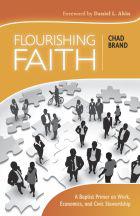 Chad Brand, Flourishing Faith: A Baptist Primer on Work, Economics, and Civic Stewardship (Grand Rapids, MI: Christian’s Library Press, 2012). Paperback/ Kindle
Chad Brand, Flourishing Faith: A Baptist Primer on Work, Economics, and Civic Stewardship (Grand Rapids, MI: Christian’s Library Press, 2012). Paperback/ Kindle
Flourishing Faith by Chad Brand is a primer on political economy from a Baptist perspective. It was commissioned by the Acton Institute and was the first of four similar volumes to appear, the others being written from Pentecostal, Wesleyan, and Reformed perspectives. I have reviewed the Pentecostal primer and will review the Wesleyan one soon. The Reformed primer has not been published yet.
Brand’s book has several strengths. First, it is clearly and succinctly written, as should be expected in such an introductory work. Second, it does an admirable job of summarizing biblical teaching and historical developments as they relate to work, wealth,and the political economy. Third, it recognizes that a Baptist political economy teaches many things that are commonly held by Christians, especially Protestant Christians. Fourth, it highlights those areas in which Baptists—better, baptistic Christians—have a unique perspective on political economy.
Historically, baptistic strands of Christianity trace their roots to 16th-century Radical Reformers (e.g., the Anabaptists) or to 17th-century English separatists (e.g., Baptists). Both strands separated the institutions of church and state to a degree unprecedented before Constantine’s conversion to Christianity in A.D. 312. Post-Constantinian Christianity generally and the Magisterial Reformation specifically saw church rites (i.e., infant baptism, confirmation, communion) as the gateway to civic participation. They viewed the church as the state’s moral tutor and the state as the church’s legal protector (and occasional enforcer). Because everyone was a Christian, if only nominally, the church understood itself to be composed of both sinners (the visible church) and saints (the invisible church). By contrast, baptistic Christianity required professed faith as the condition of baptism, viewed the church as a community of visible saints, and took a dim view of state-supported faith as a violation of the individual’s religious freedom.
In the American experiment, Baptists often took an outsized role in pushing for independence and religious freedom. Although well-known 20th-century American Baptists—Walter Rauschenbusch and Harry Emerson Fosdick among Social Gospellers, Ron Sider and Craig Blomberg among evangelicals—have been critical of capitalism, Brand draws a logical connection between religious freedom, political freedom, and free markets that is plausible, to my mind anyway.
But that connection raises my two reservations about the book. First, the Anabaptists—as opposed to the Baptists—typically have not concluded that their theological and ecclesiological commitments align with Brand’s conservative, GOP-friendly political economy. Not even Brand’s fellow Baptists have drawn these conclusions (see the four Baptists mentioned above). This suggests that Brand’s brand of Baptist political economy is a plausible, though not necessary, outcome of baptistic theological and ecclesiological commitments.
Second, while I’m sympathetic to Brand’s political economy, I’m concerned that some readers will dismiss his interpretation of the baptistic tradition because of several pointed critiques of the Obama administration. While I think that Brand’s critiques score several palpable hits, I’m unconvinced that he needed to make them in an introductory text such as this. Primers should draw a picture in broad strokes rather than in fine lines, sticking to the general rather than the particular, and the long-term rather than the right-now. As it is, Brand’s critiques seem unnecessarily partisan. One year after the book’s publication, they’re already losing their freshness, quickly approaching their sell-by date, if they have not already passed it.
In sum, Flourishing Well outlines a plausible Baptist political economy composed of a visible church, a limited state, and a free market; but it should’ve avoided critiquing the Obama administration.
P.S. If you found my review helpful, please vote “Yes” on my Amazon.com review page.

